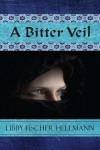A Bitter Veil by Libby Fischer Hellmann
 By Derek Gunn
By Derek Gunn
It all began with a line of Persian poetry…
Libby Fischer Hellmann has been writing professionally since 2002 and is well-known for her Ellie Foreman and Private Investigator Georgia Davis series of books. She is co-founder of Fischer Hellmann Communications, which specializes in video production, speech writing, and spokesperson training. In A BITTER VEIL, Libby’s prose flows, her characters breathe, and readers will find themselves flicking through the pages and spending more time than they had planned riveted to the book. A number of reviewers said A BITTER VEIL is a significant departure from Libby’s usual books, and it most certainly is.
A BITTER VEIL is a novel of love, revolution, and how culture can force people together and rip them apart with ruthless abandon. The book is well-researched, and the people and the geography come alive. Culture, religion and politics all feature heavily but only serve to impact characters’ views or actions.
The book introduces us to students Anna Schroder and Nouri Samedi. Anna meets Nouri while browsing a bookshop. The immediate magnetism between them flourishes over their next few years at college. While the author fleshes out her characters and we see their love blossom, we also get hints of the disintegration of the Shah’s regime in Iran. While we see two people very much in love, we are shown hints of their cultural differences. In between getting involved in meetings with other students regarding the changes in Iran, we see their relationship mature, rock a little and finally cement to the point that Nouri asks Anna to marry him and come to Iran.
Their lives begin in Iran in a wild flurry. Anna struggles to find her place in a new culture where her privileged position in Iranian society allows her to see only the sparkling veneer of the modern Iran. However, Iran is a country going through a tumultuous time. This is 1978, the Shah is deposed, and the Islamic Republic rises from the ashes of revolution. Soldiers walk the streets and demonstrations are ruthlessly dealt with.
Anna finds her life drastically changed as Ayatollah Khomeini comes to power. Her western ideals are stretched to their limit and her freedom is just one of the things she will lose. But that is not the worst surprise that will tear her life apart.
Libby took some time from her busy schedule to answer a few questions.
You seem to be very busy–a full time career and a writer. Where do you get the time?
Well… I’m really not working the day job much anymore. The late Eleanor Taylor Bland, the author of 9 mysteries, said it took her until #8 to be able to quit the day job. A BITTER VEIL is #9 or #10 depending how you count it, so I’m ready. Actually, after busting my chops over the past few years, I’m starting to realize I can take it a little easier. So I am.
How do you write? Do you have a ritual, do you plan out every detail, or do you see where the story leads?
I’ve become quite the seat-of-the-pants writer. I have a general arc for the book, but it often changes, and while I start out thinking I know who the antagonist is, it changes too. In A BITTER VEIL, I started liking and respecting the characters who, theoretically, could have committed the crime, and I ended up writing myself into a corner. I had to call a friend and brainstorm with her to find out who really did it. After I went back to make the necessary revisions, it seemed inevitable. But while I was writing it, I had no clue.
I have to ask – did you live in Iran? Your depictions of the people and the culture are really impressive. How did you get such detail? Surely not just from books?
No, I didn’t go to Iran. But I read over 20 books on the revolution, both fiction and non-fiction (A readers’ guide is included at the end of the book), and I did extensive research in other quarters. For example, I found five Iranian-Americans who lived through the revolution in Iran and generously shared their experiences with me. One of the stories was so harrowing it ended up being a part of the plot. Curiously, to a person, no-one wanted to be acknowledged by name, since all of them have relatives still in Iran.
This is very much a departure from you previous novels. Was this your intention or did the story lead you to such a diverse storyline?
I didn’t know how much of a departure it would be until I finished. I was just following the story, as you say. I was a history major in college and the actions of the past always have profound meaning for me, in terms of understanding the present.
What are your views on the eBook phenomena — is it a help or a hindrance?
For me it’s been a help. I’ve been “discovered” on Amazon, and, for the first time, I’m actually making some money from my writing. Who knew? However, we all know Amazon is the 800 pound gorilla in the room. One day they’re your best friend… the next they’re your worst enemy. It’s a delicate balancing act. I was lucky that I kept the e-rights to some of my novels when the whole thing started. But it wasn’t because I had inside information or intuition. It was blind luck. I did a presentation for Sisters in Crime on the pros and cons of e-book publishing. If readers are interested, they can find it on YouTube.
If you were given one paragraph to convince people to buy your novel what would it say?
Conflict is an essential ingredient in fiction, and the sharpest conflict I can think of is a revolution. It affects individuals, families, culture, institutions, and government. Some people become heroes; others become cowards. If you are interested in the politics and history of revolution, as well as their impact on characters, you will enjoy A BITTER VEIL.
In between work and writing do you have any time to read? Who do you enjoy most?
I read all the time. Right now, I’m reading Thomas Perry, Josh Bazell, Philip Kerr, and the Steve Jobs biography. I just finished Stephen King’s book on Kennedy (I don’t agree with his analysis, btw), a non-fiction book written by a Cuban historian called JFK: THE CUBAN CONNECTION. My latest love is Mo Hayder’s THE DEVIL OF NANKING… fabulous story, but not for the faint-hearted. Still, I’m anxious to read her series books. And I’ll read anything Michael Connelly and Val McDermid write. They can’t write a bad book.
What’s next?
Cuba. I just got back from a trip to Cuba, and I’m setting a multi-generational thriller that takes place during the revolution of 1959, the Special Period of the early Nineties, and the present. It’s the final installment of my revolution trilogy. (SET THE NIGHT ON FIRE, A BITTER VEIL, and the Cuba book, which still doesn’t have a name.) Then I’m going back to my PI Georgia Davis series — I left her several years ago on page 60 of her next investigation.
A BITTER VEIL comes out on April 15th and will keep you riveted through to the end of the month. You can find more details of Libbey’s work on her website and on Facebook. This book is thought-provoking, shocking and catches the flavor of a society being ripped apart as it struggles with its own culture, ruthless leadership, and its place in a changing world. It portrays characters lost in their troubles and how their relationships and their very lives are ripped apart by a society that was never prepared for the climatic changes that forged the modern Iran. Do yourself a favour and pick it up.
*****
 Libby Fischer Hellmann is the award-winning author of 9 crime fiction novels, including two series and several stand-alones. The Ellie Foreman suspense series, which Libby describes as a cross between “Desperate Housewives” and “24,” include AN EYE FOR MURDER, A PICTURE OF GUILT, AN IMAGE OF DEATH, and A SHOT TO DIE FOR. Libby also writes the harder edged Georgia Davis PI series, (EASY INNOCENCE, DOUBLEBACK, and TOXICITY) and the acclaimed stand-alone thriller SET THE NIGHT ON FIRE. All her books, including short stories, are available on Kindle. A BITTER VEIL, a literary thriller set in revolutionary Iran, will be released in April, 2012.
Libby Fischer Hellmann is the award-winning author of 9 crime fiction novels, including two series and several stand-alones. The Ellie Foreman suspense series, which Libby describes as a cross between “Desperate Housewives” and “24,” include AN EYE FOR MURDER, A PICTURE OF GUILT, AN IMAGE OF DEATH, and A SHOT TO DIE FOR. Libby also writes the harder edged Georgia Davis PI series, (EASY INNOCENCE, DOUBLEBACK, and TOXICITY) and the acclaimed stand-alone thriller SET THE NIGHT ON FIRE. All her books, including short stories, are available on Kindle. A BITTER VEIL, a literary thriller set in revolutionary Iran, will be released in April, 2012.
- Spotlight: M.P. Woodward - May 31, 2023
- All Saints by Jason Jack Miller - February 28, 2018
- The God Gene by F. Paul Wilson - December 31, 2017
